6 Best Real Estate Website Designs in 2023
August 30, 2023
Real Estate CRM, Real Estate Marketing

At the beginning of the year, there were an estimated 1.9 billion total websites on the internet. That number was up more than 6 million sites than only a quarter of a year prior.
With that much competitive noise, it’s getting harder and harder to stand out and make an impression on the internet.
The best real estate website design can accomplish this task for you while serving as an ongoing method of attracting leads, engaging contacts and strengthening your brand’s reputation.
Why is it important to have a website for your real estate business?
In today’s digital age, a website for your real estate business is one of the primary methods of establishing your online presence – and attracting potential clients.
Here are some reasons why having a website is crucial for your real estate business:
- Credibility: A professional website can enhance your brand reputation. It can help build trust and brand identity with potential clients – and boost your authority on the web. Websites can also serve as a way of offering your target market hyper localized content, which can help you stand apart from larger national listing sites, like Realtor.com or Zillow.
- Visibility: A website allows you to showcase your listings, services and expertise to a wider audience. The internet has very few barriers to access. That means you can use it to reach a broad range of potential clients actively searching for properties online.
- 24/7 availability: Many agents don’t work regular hours – especially if they aren’t using real estate management software to help capture and route leads while they’re not on the clock. A real estate website is a marketing strategy that makes your listings browsable round the clock – so you can enjoy some work-life balance.
- Lead generation: Your website can capture valuable contact information from site visitors. Using a variety of tools – AI chatbots, forms and downloadable content, to name a few – you can engage and convert those visitors into leads for free.
- Bragging rights: The real estate industry is incredibly competitive, with National Association of Realtor mid-year membership reports boasting over 1.5 million realtors in the US. Of these sales agents, it’s estimated only 66% have a website. Your website gives you a platform to prove why potential buyers or sellers should choose to work with you – starting with your recent success stories and sold listings.
What are the Best Design Features for a Real Estate Website?
- Search engine optimization: By building and optimizing your website with real estate-driven SEO tactics, you can increase your website’s visibility. That mix of keywords and phrases – semantic, long-tail and everywhere in between – can help continue to drive traffic to your corner of the internet, increasing the chances of converting potential leads into transaction-ready customers.
- Clean and intuitive user interface: Almost everything in life is better uncomplicated – that goes for websites, too. Keep it simple, user-friendly, clutter-free and visually appealing to engage users and get them to the content that interests them most.
- High-quality images and videos: Many times a buyer sees a property for the first time online, so it’s important to make that first impression count. Studies show that high-quality images, videos and virtual tours are more effective at attracting and engaging your leads. In fact, it’s estimated that virtual tours – either video animations or 3D photos – can sell a home 31% quicker.
- Mobile responsiveness: Think about how much time you spent at your desk versus how much time you spend on the road between clients, listings, open houses and networking events. You’re always on the move, right? Well, buyers and sellers are in the exact same situation. So, you need to be able to reach them while they’re on the go. That means making sure your website is optimized for mobile devices.
- Social media integration: Similar to mobile connection, more and more prospective leads are spending their time on social media. That means social media channels should be prioritized as a critical method of building your sphere of influence. By integrating your website with social media accounts, you can keep your brand front-of-mind by sharing property listings, industry news and client success stories. Social media is also an invaluable tool to connect with past clients and nurturing them back into an active state.
- Integration with MLS: Integrating your website with the Multiple Listing Service (MLS) helps ensure the property listings displayed on your site are always accurate. With an integrated site, when a listing is removed from the MLS, it will automatically vanish from yours, too. This can help enhance your site’s credibility among prospective clients.
- Lead capture forms: Lead capture forms gather contact information from potential clients so you can build a database for future outreach. These forms can also help you understand user preferences, so when you do follow up, you can tailor your messaging accordingly and help establish a meaningful relationship that’s far more likely to convert.
- Neighborhood information: Within your website structure, make sure you’re leaving room to provide detailed information about the neighborhoods where your properties are located. Criteria such as schools, amenities, parks and other attractions are key factors many home buyers consider when looking for a new home. By showing them that you have a comprehensive understanding of each area they’re considering – even offering alternatives in the case of housing inventory shortages in desired neighborhoods – you can set yourself apart from other agents
- Advanced search functionality:-Enhance user experience by incorporating advanced search functionality into your real estate website. This tool helps visitors to search properties based on their top considerations. Some popular criteria include minimum and maximum price values and location filters. Ultimately, this helps them get the information they want faster, reducing the risk of low engagement and high bounce rates.
6 Examples of our favorite real estate website designs
1) Springs Houses Online Realty

Springs Houses Online Realty is a leading agency in Colorado Springs. Its website is easy to understand and navigate.
That’s because the agency has included an advanced search functionality front-and-center on its homepage header. With it, a prospective customer can narrow down their desired location by city, zip code, address or MLS number, with filtering criteria available by price range.
If a prospect doesn’t immediately know this information, a professional grid layout of featured listing photos is within eye range after a single scroll down the page. A steady stream of content helps support the agency’s knowledge of the industry, while also helping support its authority score on the backend of Google’s search engine.
2) Cain Realty
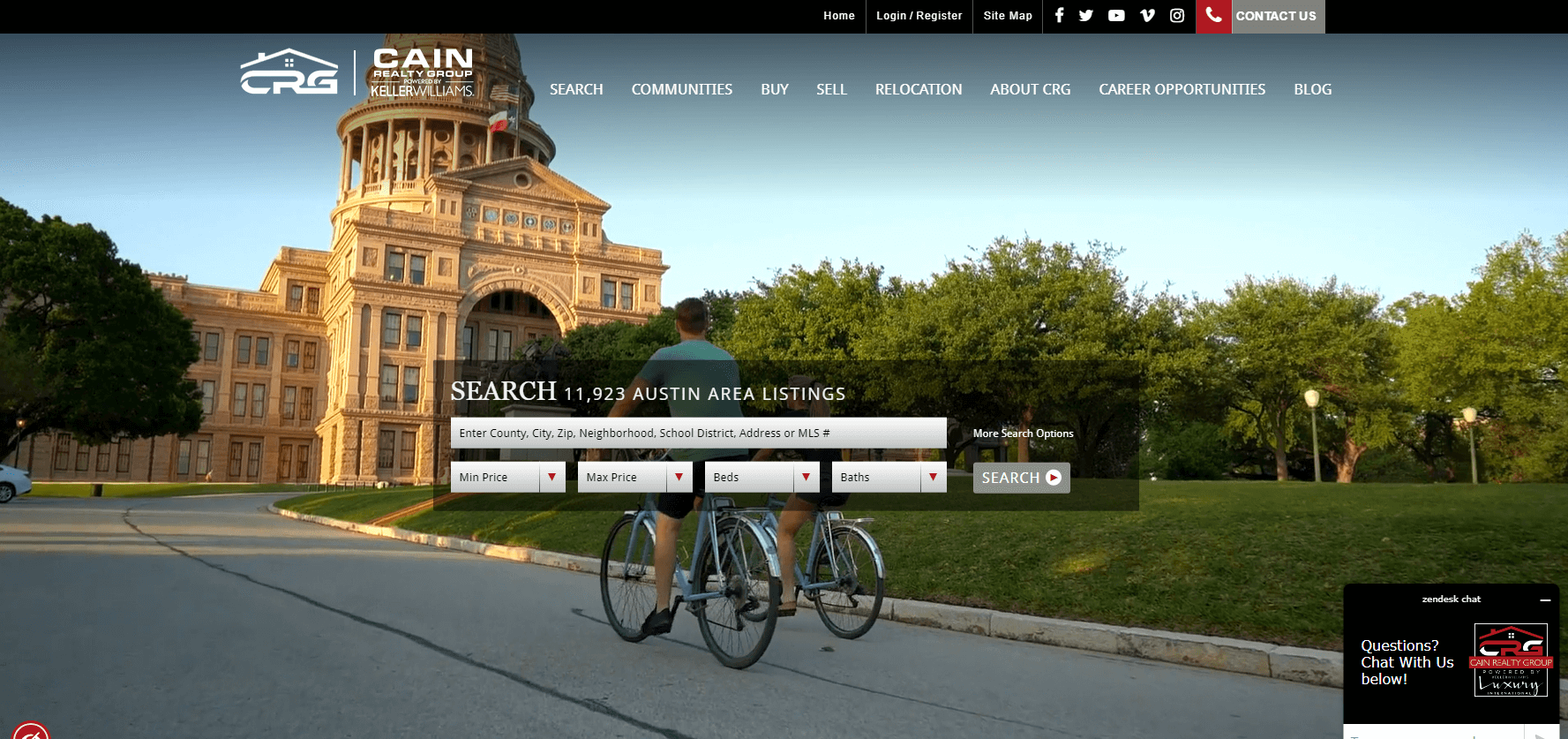
One of the things we love most about Cain Realty Group’s website – a real estate company operating as a part of Keller Williams Realty in the Austin, Texas area – is the visual effects on the home screen.
This agency has built a video feature banner right at the top of its home page. The moving images and video snippets create an attractive and visually engaging backdrop for its search function, enticing a prospect to want to be a part of the featured communities.
Directly below this visual effect are the company’s leading statistics: 6x more homes sold than the average local realtor, 24 days faster to contract than the local average and listings are sold for 2.3% more than the local average. This helps demonstrate the agency’s expertise, clearly marking them as realtors of choice for buyers and sellers.
3) Homes for Sale Team brokered by Real Broker LLC
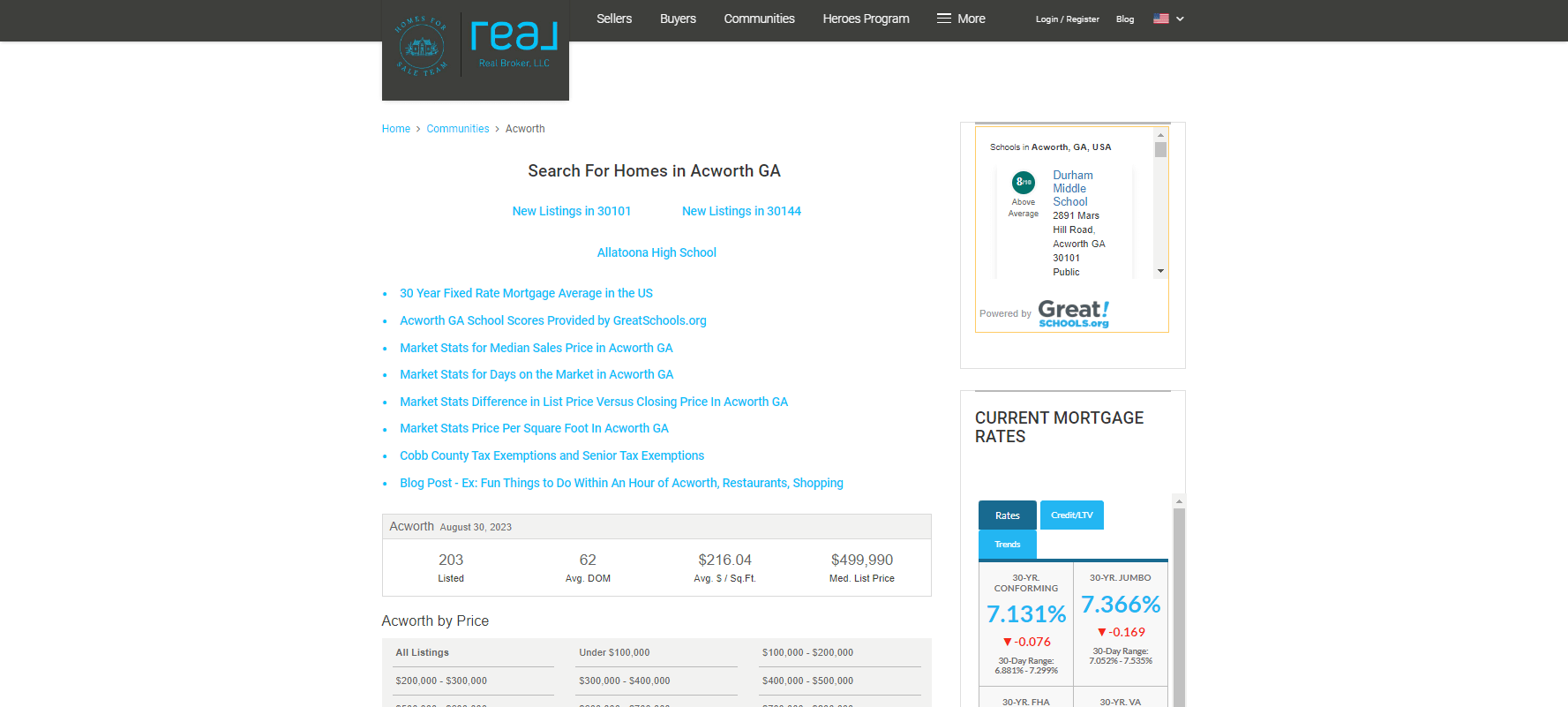
One of our favorite methods of showcasing neighborhood knowledge can be seen on Homes for Sale Team’s agency website.
The agency features a grid imagery pattern of homes for sale in specific counties – which is an important criterion many buyers consider when purchasing a home. Each image features a specific city within the county and, after clicking into it, pulls up a baseball card of statistics for the area, including market stats for median sale prices, days on the market, price per square foot, and blog posts around area amenities and events.
This helps buyers find the area and neighborhood they’re looking for, cross-referenced by available homes before an agent ever needs to lift a finger on follow-up.
4) Novak Team by Real Broker LLC
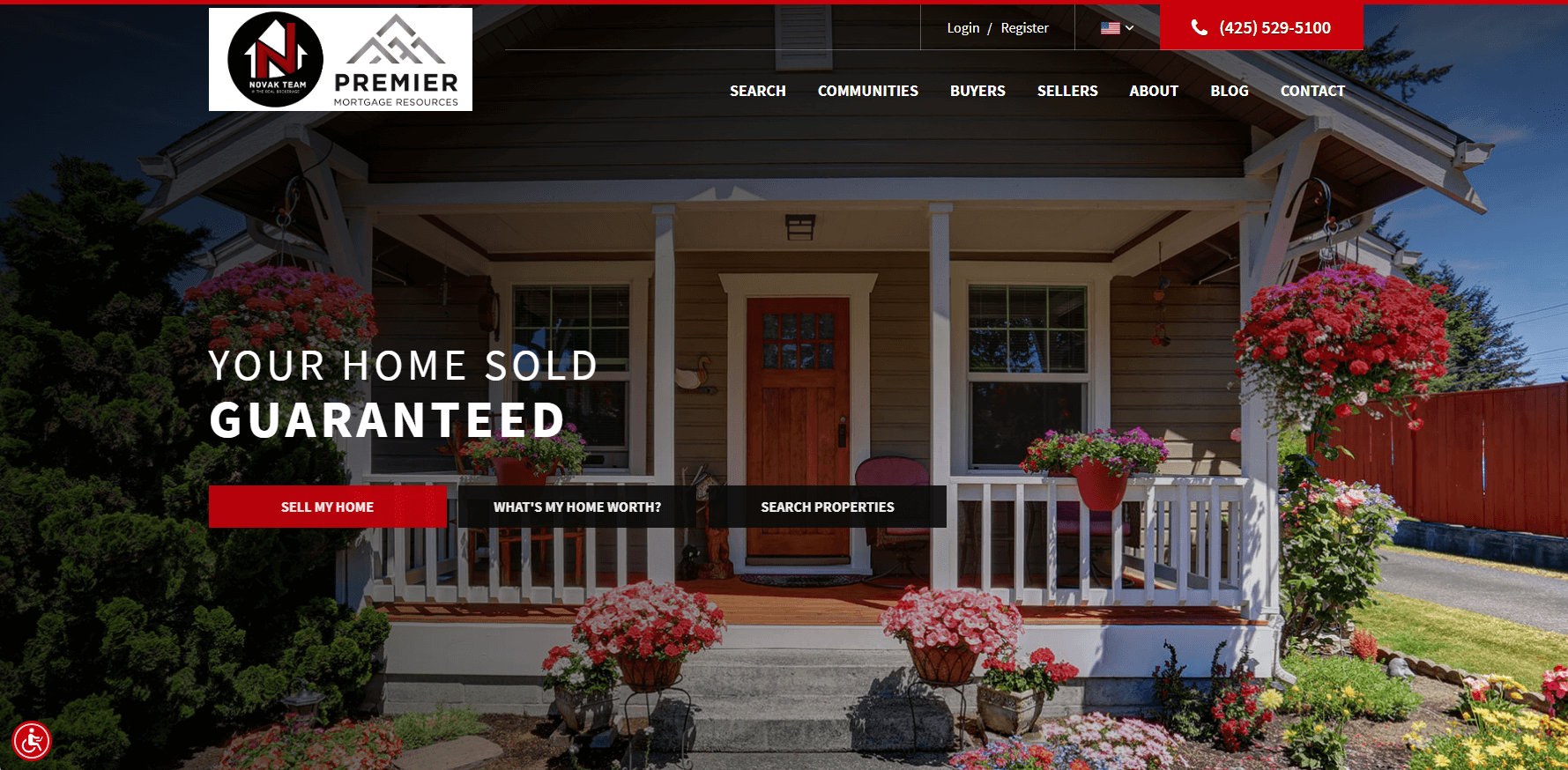
The Novak Real Estate Team is using several interesting tactics on its real estate website. First, there are attention-grabbing CTA buttons clearly visible when you reach the home page, helping narrow the intent of the site visitor as a buyer or a seller. For example, the “What’s my home worth?” button can help establish if a site visitor is searching for more information on selling their house, which can help the Novak team route their follow-up accordingly.
The Novak team also incorporates clear and specific client success stories as rotating banner imagery on its home page. These are short, clear and positive testimonials from past and current clients with first-hand experience working with the company. Many prospective clients look for this kind of information to help build trust with an agency before selecting a realtor to work with.
5) Crest Point Real Estate, by Real Broker LLC
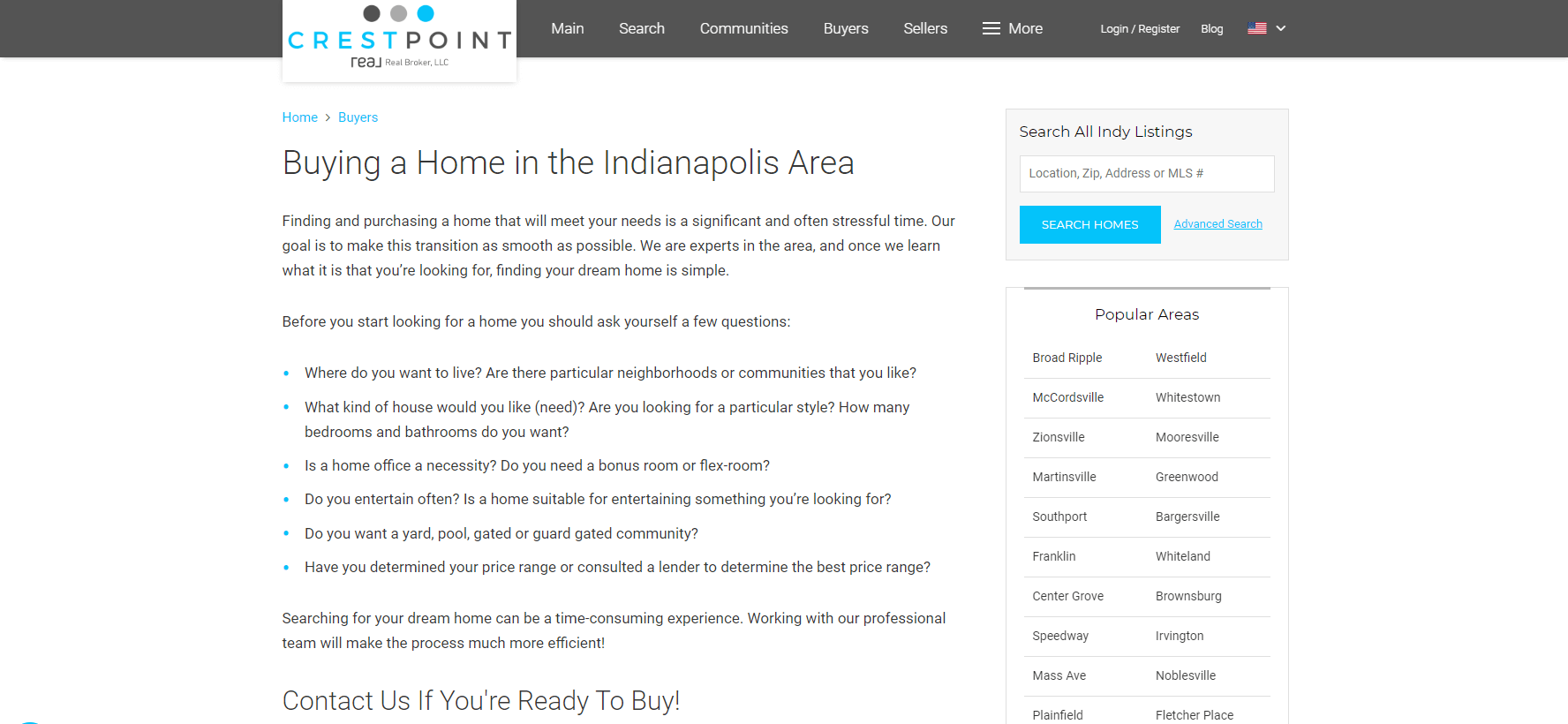
Indiana-based real estate agency Crest Point Real Estate has a clear website design that incorporates SEO tactics, including popular search functions around different keywords such as featured listings, newest listings, open houses, new construction and luxury properties.
The website also offers separate search widget tabs for buyers and sellers. The buyer page, for example, features an embedded contact form that’s incorporated with the rest of the HMTL copy, enticing prospective customers to submit their information in an easy and fast way for follow-up. Even if a buyer navigates away from the page without filling out the form, they have access to information such as popular areas where the agency offers listings.
6) Oldfather Group
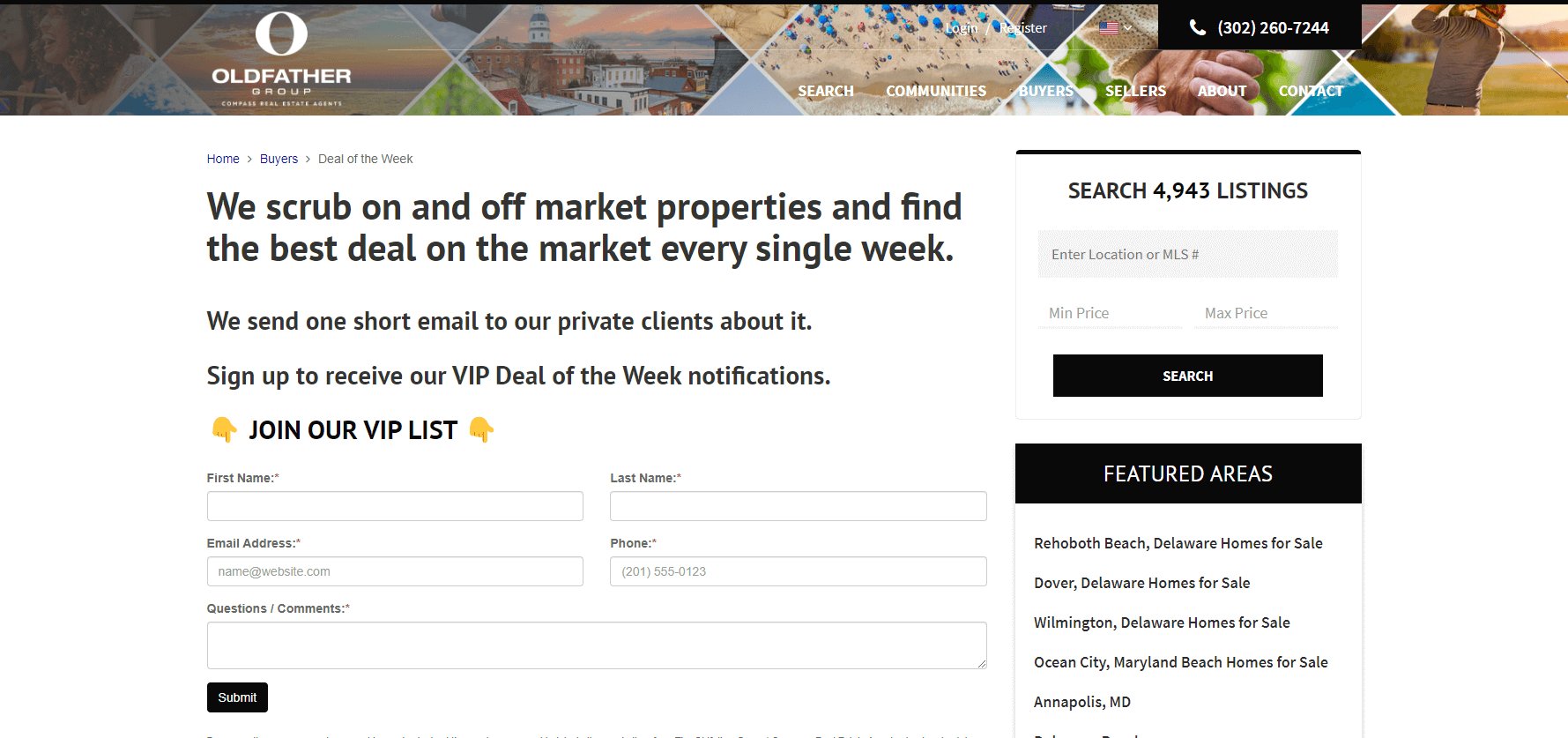
The Oldfather Group, which serves residential communities across Delaware, Maryland and Pennsylvania, also offers a minimalist yet modern design and color scheme, with clearly marked CTA elements to help discover visitor intent.
One of these CTA’s is a “Deal of the Week” button, which promises to find the prospect the best price on the market – every single week. Rather than a hard sell, the intent of this page is to encourage the prospect to fill out an embedded sign-up form for the agency’s “VIP Deal of the Week” list. This helps capture prospect information while promising to deliver valuable, consistent and exclusive information in exchange.
Frequently asked questions
Can you make your own website as a real estate agent?
Real estate agents can make their own websites, but it’s important to recognize the work it takes to accomplish effective web development. Creating an effective website that generates lead conversions involves platform selection, design, content creation, SEO optimization, integrations with MLS listings and lead capture forms, testing and ongoing promotion. Real estate agents can benefit from an industry-specific website built for SEO by a trusted real estate website software provider.
What are the different types of real estate websites?
Different types of real estate websites can include agent websites, brokerage sites and property listing platforms. Depending on an agent’s specialty, websites can be nuanced to cater to specific audiences, such as luxury markets or rentals. In any of these instances, it’s important to create your website with a proven IDX (Internet Data Exchange) website builder to dynamically pull listings directly from the MLS database.
Can Sierra Interactive build real estate websites?
Yes, Sierra Interactive is a company specializing in building comprehensive real estate websites and solutions for real estate professionals. Sierra offers customizable templates, IDX integration, lead generation tools, advanced search functionalities and an unmatched depth of knowledge of industry SEO keywords tailored for the real estate market. Their websites are proven to enhance user experience, showcase listings effectively and improve lead generation and management results. Learn more about Sierra Interactive by scheduling a demo.
Author
Schedule a Demo
Thoughtfully designed features, intuitive workflows and stunning UX. You’re about to find out why top-performing real estate teams pick Sierra.
Sign UpRelated Posts

Lead Generation
Top 10 Strategies for Capturing Real Estate Seller...

Lead Generation
The Power of Email Marketing in Real Estate...

Lead Generation
How to Generate Real Estate Seller Leads Online

Lead Generation
